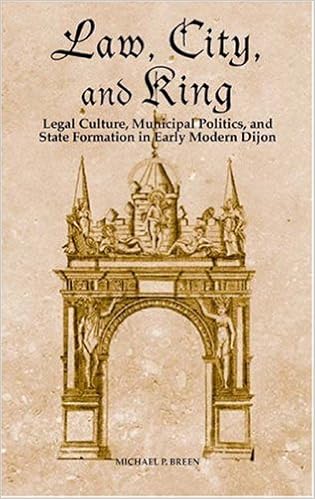
By Michael P. Breen
Legislation, urban, and King presents vital new insights into the transformation of political participation and awareness between city notables who bridged the space among neighborhood society and the nation in early glossy France. Breen's exact study exhibits how the informed, socially-middling avocats who staffed Dijon's municipality used legislations, patronage, and the opposite assets at their disposal to guard town council's authority and their very own participation in neighborhood governance. Drawing on juridical and ancient professionals, the avocats favourite a standard notion of restricted "absolute" monarchy more and more at odds with royal ideology. regardless of their efforts to withstand the monarchy's development, the growth of royal strength lower than Louis XIV ultimately excluded Dijon's avocats from the French country. In establishing up new views at the neighborhood workings of the French nation and the stories of these who participated in it, legislations, urban, and King recasts debates approximately absolutism and early smooth country formation. through concentrating on the political alienation of notables who had lengthy associated the crown to provincial society, Breen explains why Louis XIV's collaborative absolutism didn't undergo. even as, the book's exam of attorneys' political actions and ideas offers insights into the transformation of French political tradition within the a long time top as much as the French Revolution. Michael P. Breen is affiliate Professor of heritage and arts at Reed university in Portland, Oregon.
Read or Download Law, City, and King: Legal Culture, Municipal Politics, and State Formation in Early Modern Dijon (Changing Perspectives on Early Modern Europe) PDF
Similar France books
In comparison to Casablanca via the Washington submit, this a page–turning tale of a bunch of resistance employees who secreted downed Allied fighter pilots via France and into defense in Spain in the course of global warfare II. As conflict raged opposed to Hitler's Germany, a growing number of Allied fliers have been shot down on missions opposed to Nazi ambitions in occupied Europe.
Aristocracy and its Enemies in the Age of Revolution
Seeing that time immemorial Europe were ruled by way of nobles and nobilities. within the eighteenth century their energy appeared greater entrenched than ever. yet in 1790 the French revolutionaries made a decided try to abolish the Aristocracy solely. "Aristocracy" turned the time period for every little thing they have been opposed to, and the the Aristocracy of France, so lately the main outstanding and complex elite within the eu global, came across itself persecuted in ways in which horrified opposite numbers in different nations.
Dandyism in the Age of Revolution: The Art of the Cut
From the colour of a politician’s tie, to exorbitantly high priced haircuts, to the dimensions of an American flag pin decorating a lapel, it’s no mystery that variety has political which means. And there has been no time in background while the politics of style was once extra fraught than throughout the French Revolution. within the 1790s virtually any article of garments should be scrutinized for facts of one’s political association.
The Liberation of Painting: Modernism and Anarchism in Avant-Guerre Paris
The years sooner than global warfare I have been a time of social and political ferment in Europe, which profoundly affected the artwork global. an enormous heart of this artistic tumult was once Paris, the place many avant-garde artists sought to remodel glossy paintings via their engagement with radical politics. during this provocative research of paintings and anarchism in prewar France, Patricia Leighten argues that anarchist aesthetics and a comparable politics of shape performed the most important roles within the improvement of recent artwork, merely to be suppressed via battle fever after which forgotten.
Extra resources for Law, City, and King: Legal Culture, Municipal Politics, and State Formation in Early Modern Dijon (Changing Perspectives on Early Modern Europe)



